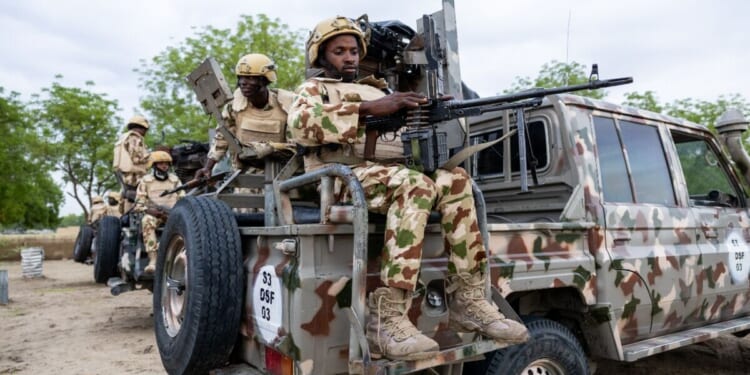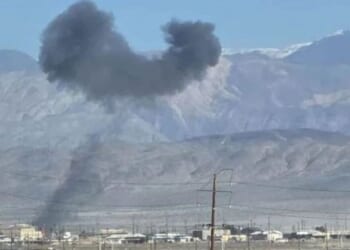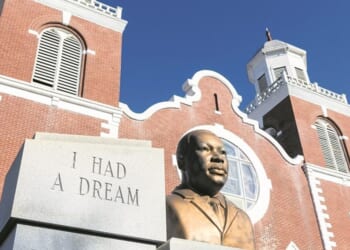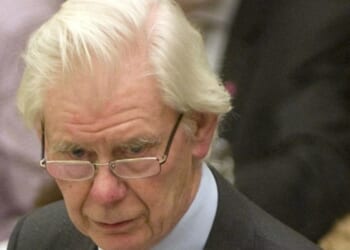The killing of thousands of Christians in an extreme Islamist insurgency in Africa must be declared a genocide, a bishop has said. John Bakeni is the Auxiliary Bishop of Maiduguri Diocese in Borno State, a heartland for Boko Haram terrorists in north-east Nigeria.
On his first UK visit, Bishop Bakeni will lay bare “the reality” of Christians being persecuted in parts of his country when he addresses Parliament on Tuesday at the launch of a report on religious freedom compiled by Aid to the Church in Need (UK).
The bishop told the Daily Express Christians are being terrorised by insurgents in north east Nigeria, by bandits in the country’s north west and there are systematic killings, displacements and destruction of whole communities in the north-central region.
Bishop Bakeni, 50, said: “How many lives must be eliminated for these events to qualify as a genocide? I can say there really is a genocide going on in the north east of both Muslims [who refuse to comply with Boko Haram] and Christians.”
He said it was also becoming increasingly difficult for the Church in parts of Nigeria to buy land to build places of worship on; people were forcibly being converted and fewer institutions were offering space for Christians to practise their faith.
The religious leader, who was ordained in 2002 and became a bishop in July 2022, spoke of churches, schools and hospitals being destroyed by insurgents. The bishop revealed he suffered a breakdown after four years supporting families traumatised by violence.
Britain has long argued that, in line with the Genocide Convention, determining a genocide rests with international courts and tribunals, not governments.
Dr Folahanmi Aina, a lecturer at the School of Oriental and African Studies, told the Express that the actions of Boko Haram and offshoot Islamic State West Africa Province cannot be accurately described as genocidal.
He said: “Genocide, as defined by the UN, is any act committed with the intent to destroy, in whole or in part, a national, ethnic, racial, or religious group.
“The operational pattern of these groups is indiscriminate. They target vulnerable civilian populations without care or mercy for any specific religious affiliation. This includes attacking both Muslims and Christians.”
Dr Aina said the causes of the insurgency are mainly poor governance, corruption, poverty, unemployment, climate-induced resource competition and local grievances.
Boko Haram’s insurgency started in July 2009 when the rebel militant Islamist group launched an armed rebellion against the Nigerian government. The jihadis’ campaign of terror has been largely centred on states in northern Nigeria, where Muslims make up about half the population.
*In April 2014, Boko Haram terrorists abducted about 276 girls from a school in Chibok, Borno State. They were sold for marriage in Cameroon and Chad, where along with Mali and Niger the group’s violence has also spread.
Thousands have been massacred in attacks by the group, including in Baga in 2015 when some 2,000 innocents were slain. Suicide bombings by Boko Haram fanatics have also claimed scores of lives in the region.
More than 5,000 people were forced to flee to Cameroon when Boko Haram seized the border town of Kirawa in Borno State in October.
Bishop Bakeni described Boko Haram insurgents shouting “Allahu akbar”, meaning “God is greatest”, as they kicked down church doors and dragged worshippers outside to be killed in heinous acts the militants claim were carried out in the name of Islam.
Despite the dangers, Bishop Bakeni said he and his colleagues will continue their work. He said: “Safety is important, but we have reached a stage where the truth has to be told. I’m very much aware it comes with a price.”
Dr Caroline Hull, National Director of ACN, said she had seen for herself the difficulties many Christians face in Borno State’s capital, Maiduguri.
She said: “Religious persecution certainly plays a role in all this violence and hatred. It’s time we all stand up for religious freedom throughout today’s divided world.”
Bishop Bakeni said the British Government’s apparent refusal to recognise religion as a cause of the insurgency risked “watering down” the seriousness of the conflict.
Crossbench peer Lord Alton was told in answer to a parliamentary question in June that the Government didn’t recognise religion as a cause of the conflict in Benue State, where a wave of killings recently erupted.
The state saw over 1,000 people killed between May 2023 and the same month this year amid a violent conflict between farmers and herders.
In reply to Lord Alton’s question, Labour peer, Lord Collins, said the Government was “deeply concerned” by the violence, but religion wasn’t considered a cause in the conflicts.
Lord Alton, who said he was “deeply disappointed” by official responses to his entreaties, said: “Year after bloody year, in the face of this silent slaughter of Christians, and non-compliant Muslims, the world simply chooses to look the other way and refuses to name the motivation of the perpetrators of these horrendous crimes.”
He told the Express: “Why has Boko Haram been given a green light to continue with its killings, rapes and abductions – all part of a distorted Jihadist ideology? Where are the protests, where are the marches, where are the demands to end this carnage?”
Dr Aina said while false religious doctrines are weaponised by the insurgents to justify violence and recruit members, religion itself is “at most” a minor contributory factor, not an essential enabler of violent extremism.
A Foreign Office Spokesperson said: “The UK condemns the horrific violence carried out by Boko Haram and other armed groups in northeast Nigeria. These terrorists are targeting innocent civilians and are attacking people’s right to practise their faith freely.
“We are working with Nigeria and our partners in the region to promote peace, hold the perpetrators of these barbaric crimes accountable and to support the innocent people devastated by their violence.”
The Foreign Office maintained its position that religion is not the main causal factor in Nigeria’s inter-communal violence, adding it was “clear” the impacts were being “felt acutely” by religious communities.
It said Britain regularly raises issues linked to freedom of religion or belief with the Nigerian government, is supporting affected communities and strengthening counter-terror investigators’ capacity to hold perpetrators of violence accountable.

















